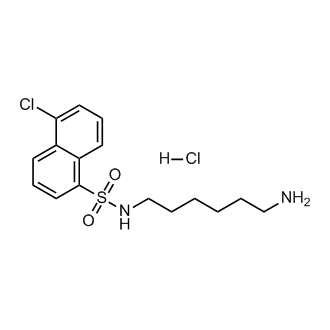| Size | Price | Stock |
|---|---|---|
| 5mg | $27 | In-stock |
| 10mg | $40 | In-stock |
| 25mg | $65 | In-stock |
| 50mg | $90 | In-stock |
| 100mg | $135 | In-stock |
| 200 mg | Get quote | |
| 500 mg | Get quote | |
| We match the lowest price on market. | ||
We offer a substantial discount on larger orders, please inquire via [email protected]
or Fax: (86)21-58955996
Inquiry for price and availability only. Please place your order via our email or fax.
| Cat. No. : | HY-100912 |
| M.Wt: | 377.33 |
| Formula: | C16H22Cl2N2O2S |
| Purity: | >98 % |
| Solubility: | DMSO : 250 mg/mL (662.55 mM; Need ultrasonic); H2O : 1.43 mg/mL (3.79 mM; ultrasonic and warming and heat to 60°C) |
W-7 hydrochloride is a selective calmodulin antagonist. W-7 hydrochloride inhibits the Ca2+-calmodulin-dependent phosphodiesterase and myosin light chain kinase with IC50 values of 28 μM and 51 µM, respectively[1][2]. W-7 hydrochloride induces apoptosis and has antitumor activity[3].
IC50 & Target: IC50: 28 μM (Phosphodiesterase) and 51 µM (Myosin light chain kinase)[1]
In Vitro: W-7 is distributed mainly in the cytoplasm, and inhibits proliferation of Chinese hamster ovary K1 (CHO-K1) cells. W-7 selectively blocks the phase of the cell cycle (G1/S boundary phase) in a manner. 25 μM W-7 arrests the growth of the cells at the G1/S boundary phase of the cell cycle[1].
W-7 (100 μM) exhibits a similar extent of antagonism between the contractile responses to carbachol and KCl. The increase in myosin light chain (P-LC) phosphate content in response to 1-min stimulation with 10 μM carbachol is inhibited by W-7. W-7 antagonizes the smooth muscle contraction through the inhibition of the initial increase in the P-LC phosphorylation[2].
Treatment with W-7 results in the dose-dependent inhibition of cell proliferation in various human multiple myeloma cell lines. W-7 induces G1 phase cell cycle arrest by downregulating cyclins and upregulating p21cip1. W-7 induces apoptosis via caspase activation; this occurred partly through the elevation of intracellular calcium levels and mitochondrial membrane potential depolarization and through inhibition of the STAT3 phosphorylation and subsequent downregulation of Mcl-1 protein[3].
W-7 competitively inhibits Ca2+/calmodulin-dependent phosphodiesterase with a Ki value of 300 μM[4].
In Vivo: W-7 (3 mg/kg; intraperitoneal injection; on 5 consecutive days per week; female BALB/c nu mice) treatment significantly reduces tumor growth in a murine MM model[3].
Lorem ipsum dolor sit amet, consectetur adipisicing elit. Autem earum hic iste maiores, nam neque rem suscipit. Adipisci consequatur error exercitationem fugit ipsam optio qui, quibusdam repellendus sed vero! Debitis.
Inquiry Information- Product Name:
- W-7 (hydrochloride)
- Cat. No.:
- HY-100912
- Quantity:


Your information is safe with us.